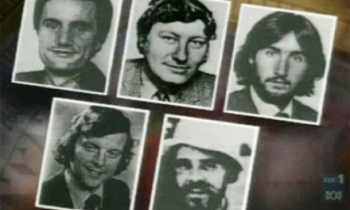The decline of our media system has been well documented. Every week seems to bring with it news about how the news is screwed up. Media concentration, commercial imperatives and a clear conservative tilt is tuning out and turning off viewers, readers and listeners.
Journalists are under fire from every side of the partisan divide.
You get the feeling that we are living in the last days of our media system. Ten years ago, the writer Michael Crichton predicted it would happen in an introduction to the 1995 edition of Project Censored. The author of Jurassic Park said he wanted to focus on another "dinosaur" on the "road to extinction."
"I am referring to the American media. And I use the term extinction literally. To my mind, it is likely that what we now understand as the mass media will be gone within the next ten years. Vanished without a trace."
While his prediction may have been off by a few years, he saw what others didn't, perhaps because it takes a novelist to understand reality in a deeper way.
He wrote before all the changes we are witnessing -- more viewers watching cable than network, the growth of satellite channels, a dramatic decline of newspaper circulation, the rise of the internet and the proliferation of diverse content, the search engines and the bloggers and the new digital technologies.
Alongside all this we have been confronted with unprecedented media concentration and the rise of aggressive partisan "news" (sic) as exemplified by Fox News and its kith and kin. The public has turned media into an issue with charges of bias flying on sides and no one happy with the system we have. Kids are deserting news channels for comedy channels while seniors grouse at the obvious decline and dumbing down that has long been underway as show business merges into and takes over news business.
The prospects of alternative media outlets in this climate has never been more promising, but little of it has an economic foundation. Sustaining Indy media outlets turns journalists into fundraisers and makes institution-building difficult. The marketing and promotion dollars needed to produce the revenue streams that assure survival, and build or sustain new brands, are hard to come by.
Many financiers would rather pour investments into known companies even when they burn it a high rate rather than more innovative untested ventures. Think of all the money that went down the Internet rat hole in the boom years. Think about how we in the independent media could have put it to better use.
How to Sustain Indy Media?
We at MediaChannel know this problem/challenge well. There are all too few not-for-profit funders who understand longer-term commitments and what it takes for an alternative media institution to become viable and keep going. I wish I had a dollar for everyone who sums up the solution to our needs in the words "George Soros" -- as if one philanthropist is the answer. He isn't. Most don't know that Mr. Soros has never been a big long-term media funder although did help us get going.
As we mark our fifth anniversary, we need to build on our strengths and think about new directions. We want to become more influential and impactful.
At the same time, a solution may be right in front of our eyes that only a few see. Perhaps we have to look for answers down on main street, not up on Wall Street. Popular dissatisfaction with the media -- estimated at 70% in some surveys that find similar disaffection inside the media -- suggests that its time to go in another direction.
I can sum it up in one sentence:
Democratize the media by allowing citizens to be more than media consumers.
It's called "citizen journalism, and it's the NBT (Next Big Thing.) Rather than think of audiences as passive consumers, activate them as participants. Replace an elite top-down model with a more populist bottom-up approach. Think this is idealistic or impossible? Think again.
Look at the growth of talk radio, and the proliferation of websites including search engines like Google that virtually replace libraries, There's the spread of the "be the media" movement led by IndyMedia. There's been the meteoric growth of the blogosphere and the emergence of thousands of video activists making programs for in public access or showcasing films and documentaries at festivals worldwide. Scholars and writers are contributing to first-rate publishing projects like the Wikipedia. Citizens' media watches are springing up.
"Every Citizen a Reporter"
Across the globe, citizens are voting for this new media order with their attention spans, eyeballs and dollars. One successful example South Korea's OhmyNews. Now marking its 5th anniversary, founder Oh Yeon Ho told the Japan Media Review about it:
"In Korea, readers' dissatisfaction and distrust with the conventional press had considerably increased. Citizens' desire to express themselves greatly increased. Thus, on the one hand, discontent with the conventional press, on the other hand, citizens desire to talk about themselves. These two things were joined together.
"The reason the Internet was highly attractive was that I had little money and the Internet meant launching was relatively easy at first -- easier than paper newspapers. So I thought the Internet was the space where a few people who possessed nothing could bring about results using guerrilla methods. I thought up our motto, slogan, or concept -- 'every citizen is a reporter.'"
Ohmy has evolved into a major media force and was even credited with the election of a president. Inspired in part by the example, a well-known U.S. newspaperman Dan Gillmor left his job as a technology reporter at the San Jose Mercury to develop a venture in the U.S., based on similar principles. His approach is populist and "post partisan." He told Ohmy:
"I have interests beyond politics and I don't want to be creating something that is partisan. I think there is a giant group in the middle of American politics that knows that things are really wrong in many ways but they don't like the completely polarized left vs. right that was created during the last few years.
"The doctrinaire left cannot see things beyond politics from 40 years ago and still isn't sure about empowering business, for example."
While Gillmor has not announced his plan -- MediaChannel.org has. We are exploring a citizens' journalism model to activate public involvement in promoting media accountability and responsibility. We are interested not just in what's wrong about our media system but how to make it right.
We want to encourage the innovators and visionaries among us to help us define a way forward that includes beyond protest and engages public interest. Of the 75,000 readers who signed up with Media For Democracy, fully 20% did not define themselves as progressive.
They know as do all that fixing our media, insuring diversity and debate is in everyone's interest. Join us as we discuss how to make our work more participatory, diverse and relevant.









